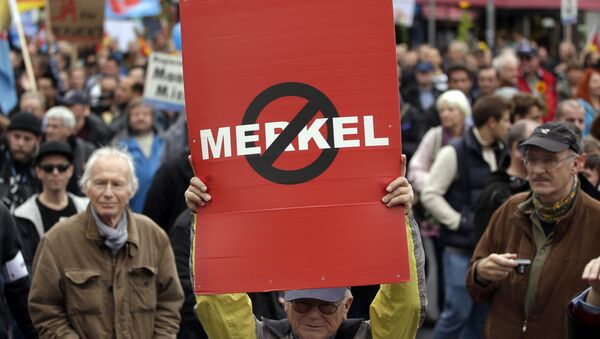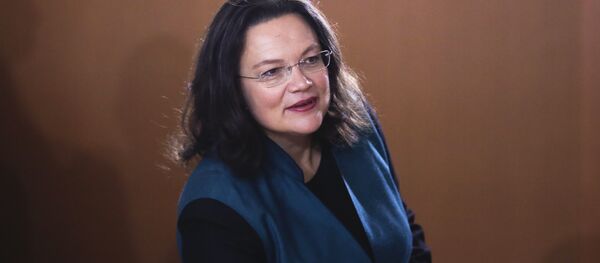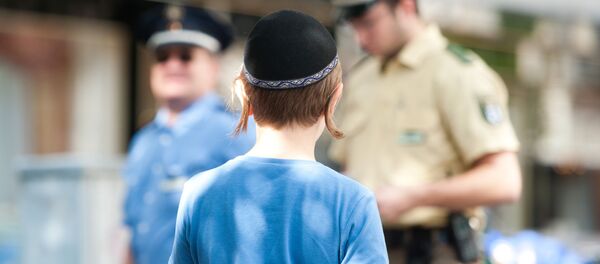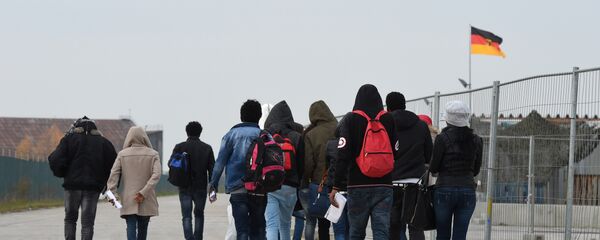Moreover, both the SPD and Merkel’s alliance — Christian Democrats (CDU) and its Bavarian sister party the CSU — have suffered considerable losses in European Parliament elections. The SPD, which is a member of the ruling coalition, is the second most powerful political force in the German parliament.
Meanwhile, according to local media, senior German politicians are more and more seriously talking of leaving the ruling alliance, at the risk of provoking early elections and a premature departure of the chancellor, whose mandate ends in 2021.
Sputnik has discussed the issue with Dr. Jochen Staadt, a political analyst and head of the Free University of Berlin’s research team on the German Democratic Republic.
Sputnik: Andrea Nahles said on Sunday she would resign as the leader of the SPD. How will this affect Merkel’s ruling coalition?
Jochen Staadt: Chancellor Merkel said yesterday that she would continue working with the coalition.
The question would be what Social Democrats decide for the future. I think the decision is open inside the Social Democratic Party because a lot of younger Social Democrats demanded that the Social Democrats should leave the coalition.
Sputnik: Who may replace Mrs. Nahles?
Jochen Staadt: That’s open. They have now three people who in time will lead the party, and they are looking for someone who can do it. I think they are now discussing two women, Minister-President of Mecklenburg-Vorpommern Manuela Schwesig, and Minister-President of Rheinland-Pfalz Malu Dreyer, who might be possible leaders of the party.
It is also discussed whether they will have two people leading the party.
Sputnik: How can this person, when elected, change the political landscape in Germany and the coalition?
Jochen Staadt: That will be very difficult to change the position of the Social Democratic Party which brought them into these results of the European election because they lost a lot of followers that were traditional electorate of the Social Democrats; that were the working class people and the people who are working in middle positions in the industry.
And I don’t see how they will win their votes back.
Jochen Staadt: He is right. Grand coalitions are in the history of Germany; before this one, we had only one in the 1960-s and this was a special situation whether the martial law had to be brought through the Parliament, and they had to have a big majority for that.
So, they were going together until 1969 for three years; and now we have a longer time, a great coalition running. And it leads to losses for both of the partners – the CDU will lose votes, and the Social Democrats will lose votes.
I don’t think that it’s bad for the democracy because you can see that the Greens, for example, were getting stronger and stronger out of the opposition against the great coalition; and after the next election I think we will face another kind of coalition, it won’t be a coalition between the CDU and the Social Democrats.
We couldn’t call it a great coalition anymore.
Sputnik: What are the possible reasons behind this current crisis in the country?
Jochen Staadt: As we’ve just discussed, it is a problem if you have two biggest parties coming together in a great coalition and having opposition in the Parliament.
So, mistrust comes up; and mistrust leads to, on the one side, winning votes on the right-wing AfD, and on the other side, it leads to the opposition parties, like the Greens, getting stronger and stronger.
And now, in the new policy, they are nearby the CDU; and if there are elections next time, we have a new big party and I think it’s good for democracy that this has happened. Otherwise, it would be kind of standing still in the country if the great coalition continued.
Views and opinions expressed in this article are those of Jochen Staadt and do not necessarily reflect those of Sputnik.




